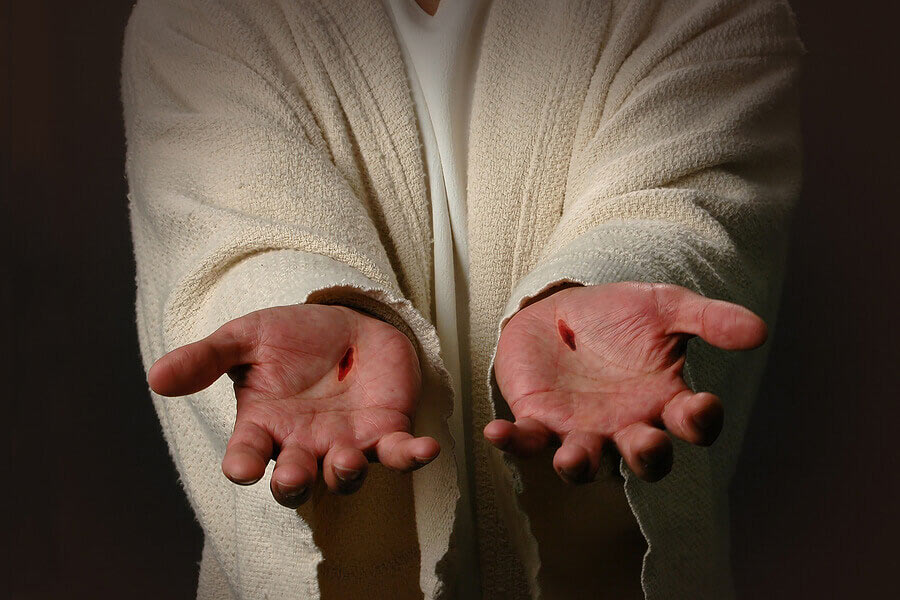“The next day…the chief priests and the Pharisees went to Pilate. “Sir,” they said, “we remember that while he was still alive that deceiver said, ‘After three days I will rise again.’ So give the order for the tomb to be made secure until the third day. Otherwise, his disciples may come and steal the body and tell the people that He has been raised from the dead. This last deception will be worse than the first.” Matthew 27:62-64
(After the resurrection) “…some of the guards reported to the chief priests everything that had happened. When the chief priests had met with the elders and devised a plan, they gave the soldiers a large sum of money, telling them, ‘You are to say,’ “His disciples came during the night and stole him away while we were asleep.” …So the soldiers took the money and did as they were instructed.” Matthew 28:11-15
Why didn’t Jesus in any of the appearances after his resurrection show himself to those who crucified him, his undeterred enemies? Why not display to them his nail prints, the scar in his side, the gouges in his head, which they inflicted as much as the soldiers, saying, “Here I am alive again as I promised,” just as he had done for his disciples and followers? Yet Jesus knew, even if standing right before them, their minds would deny what their eyes saw; for their unbelief was resolute. This is the nature of unbelief; truth is irrelevant just as it is considered variable. Their predisposition to unbelief is so absolute, not even obvious truth can dissuade from its vice grip on their minds. Remember, just prior to the trial and crucifixion of Jesus many of the chief priests and rulers of the Jews had personally witnessed Jesus raising Lazarus from the dead four days after he had clearly died. Their reaction? Immediately plot to murder both Lazarus and Jesus and in so doing blot out all evidence of both the miracle worker and the miracle, as if the truth can be so easily erased. Would the actual resurrection of Jesus days later change these predisposed minds convincing them finally Jesus was exactly who he claimed to be, the Messiah, God in the flesh? No, it would not, sadly, and Jesus knew this.
It is a chilling thought and feeling to face hardened unbelief. It is incredulous for those who see the truth and its overwhelming evidence to understand how unbelievers can look it in the face and blatantly deny it. It is certainly discouraging in bearing witness to the truth to meet with uncomprehending responses and then scorn when it appears so clear to you. The nature of unbelief was not a mystery to Jesus; and learning from him, neither should it be to you. Jesus confronted unbelief when faced with it, but he did not let it discourage him from his mission to bear witness to the truth, knowing the Spirit of God can penetrate any barrier when God has willed it. Yet if the Spirit did not choose, the barrier would not be breached by us. We are only successful in bearing witness of the truth to unbelievers where the Spirit penetrates unbelief removing the scales from their eyes so they can finally see.
Expect resolute unbelief, but do not allow it to keep you from persevering in your witness. As Jesus says in His encounter with Nicodemus, the Spirit’s operating method from our perspective is like the wind, blowing where He wills, not knowing where He comes from, or where He is going, but seeing the result when He passes. He enlists you to speak truth into ears where he opens hearts to receive it. If he doesn’t, the heart and mind remain closed. Still the Spirit, capable of acting alone, calls you to be a co-witness to truth by mouth and example; and yet the acceptance of your witness by others is always in the Spirit’s hands, not according to your eloquence or power of personality, but according to your faithfulness.
We are living in a day where in our world unbelief is more obvious, brazen, and accepted, even preferred. Whether or not it is more universal than at other seasons of history; probably not. Yet in my life span alone, today there is more “in your face” unbelief! Perhaps this is a sign of God’s “winnowing the chaff from the wheat” where in this process genuine followers of Jesus are being “winnowed out” from those who are pretending and two-faced. Psalm 1 from millennia past is still pertinent today, seeing it is ever true that “I the Lord do not change; I am the same yesterday, today, and forever,” in defining a genuine follower, a true disciple, with these character traits: a man or woman who does not walk in the counsel of the wicked, or stand in the way of sinners, or sit in the seat of mockers, but rather delights in the law of the Lord, and on that law meditates day and night. These are like a tree planted by streams of (living) water, which yields its fruit in season, and whose leaf does not wither. Whatever they do prospers (spiritually).
The resoluteness of unbelief is neither a surprise, nor an effectual hindrance to faithfulness in the face of tribulation, for our Master followed this same path and confronted the same enemy. It is He who says in these days to those who would call him Lord and mean it, “Be faithful, even to the point of death, and I will give you the crown of life.”
“Long my imprisoned spirit lay fast bound in sin and nature’s night; thine eye diffused a quickening ray; I woke, the dungeon flamed with light; my chains fell off, my heart was free; I rose, went forth, and followed thee. Amazing love! How can it be that thou, my God, shouldst die for me?”
(4th verse of Charles Wesley’s hymn, “And Can it Be that I Should Gain”, 1738)
Stay Updated
Sign up for our monthly newsletter and weekly devotional











